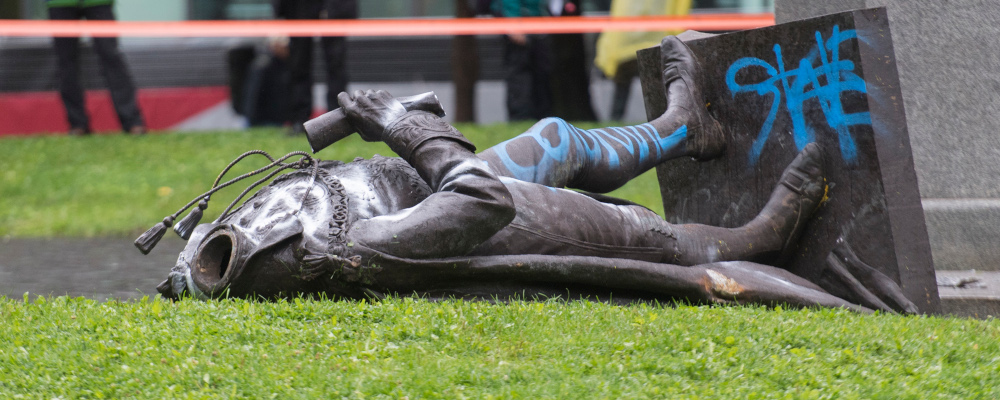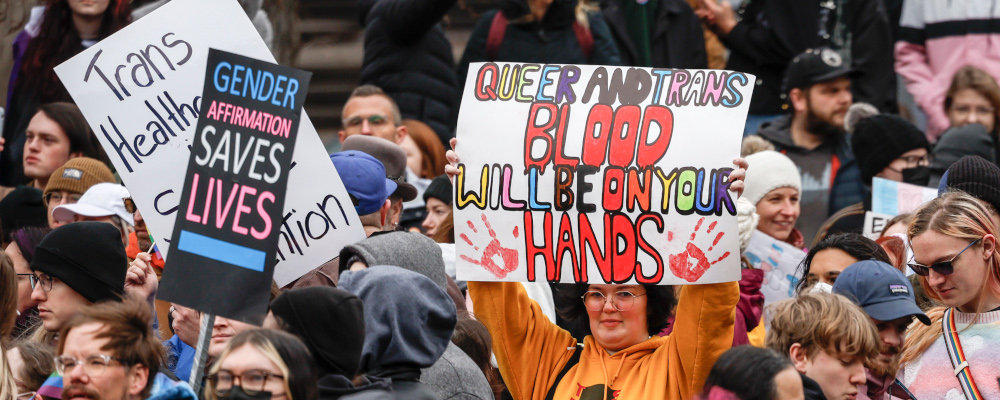Canadians have nearly identical views on culture war issues to Americans and Britons. Across some fifty questions concerning free speech, national heritage, and transgender issues, Canadians, like Britons and Americans, lean around two-to-one against the “woke” cultural socialist option and in favour of cultural liberalism or conservatism. This is the story that emerges from my new report for the Macdonald-Laurier Institute, “The Politics of the Culture Wars in Canada.”
Woke refers to the sacralization of historically marginalized race, gender, and sexual identity groups. This belief system elevates equal outcomes and emotional harm protection for such groups as its highest value. As a result, woke activists seek to cancel speakers or historical figures deemed to be offending the sensibilities of the most hypothetically sensitive member of a minority group. In this clash of values, cultural socialism trumps expressive freedom and symbolic attachment.
Prime Minister Justin Trudeau has distinguished himself on the world stage as the paragon of this belief system, and many outside Canada assume he reflects an equally woke Canadian public. But is this truly the case? To better understand Canadian views, The Macdonald-Laurier Institute asked Maru Public Opinion Polls to conduct a nationally representative survey of 1,500 adults, in which I fielded numerous questions previously put to American and British samples.

What did I find? Surprisingly, despite their reputation, Canadians largely reject the woke ideology. For instance, they oppose the idea of separating pupils in class by race—assigning whites as privileged and minorities as oppressed—by a whopping 92 to 8. By 85-15, they reject the idea of teaching children that “There is no such thing as biological sex, only gender preference.” Excluding those with no opinion, 80 percent of respondents were against the idea of J.K. Rowling being dropped by her publisher. By a similar slant, Canadians say “political correctness has gone too far.”
In most cases, respondents came out strongly against established practices found in Canadian institutions. For example, when Toronto teacher Richard Bilkszto pushed back against diversity trainer Kike Ojo-Thompson’s characterization of Canada as more racist than the United States, none of his colleagues defended him and his travails eventually drove him to suicide. Yet, by a stunning 95-5 margin, Canadians overwhelmingly reject the idea that their country is more racist than other countries. Among those with an opinion, just 30 percent say that Canada is a racist country while 70 percent disagree. A similar share says they do not want schoolchildren taught that the country is racist.
Or consider the fact that almost all statues of Sir John A. Macdonald have been removed from major Canadian cities. Yet, Canadians oppose removing statues of Canada’s Father of Confederation by a two-to-one ratio. Among those with an opinion, a mere 8 percent say activists should be allowed to remove statues without government approval, with 92 percent against. Almost 45 percent of Tory and PPC voters strongly disagree with removing Macdonald. In addition, only 5 percent of Liberal, NDP, and Green voters strongly agree that his statues should be removed. The majority of left-wing voters oppose rather than support Macdonald’s removal.
Canada has been one of the most trans-affirming societies on earth. Only in the past year have conservative premiers in New Brunswick, Saskatchewan, and Alberta begun to curb trans activism in education by requiring schools to inform parents of their children’s change of pronouns. And only recently has Pierre Poillievre been willing to oppose puberty blockers for minors. In Premier Doug Ford’s Ontario, not to mention in provinces run by the NDP or Liberals, the writ of trans activism runs through government and the schools.
But when we look at public opinion on the trans question, an entirely different picture emerges. By a four-to-one ratio, Canadians oppose gender reassignment surgery for those under 16. By two-to-one, they want parents informed of pronoun changes at school and don’t want transgender women (i.e. biological males) to enter women’s sports competitions. Three in four Canadians say we talk too much about transgenderism. Even when it comes to people displaying their pronouns in work emails or social media profiles, more Canadians disapprove of this practice than support it, placing them even to the right of the British public.
It is striking how similar Canadian public opinion is to that of supposedly more conservative America or Britain. Across 30 questions I asked in Britain in 2022 and Canada in 2023, the average difference in opinion between the two countries is just 0.3 of a percentage point. Furthermore, of the 13 questions asked in the U.S. in 2021, the average gap with this Canadian survey was just one point! There is essentially no appreciable difference—especially if we take variation in date and sample (as well as random error) into account. Canadians are somewhat more likely than Britons or Americans to say biological males who identify as women should be allowed in women’s sports, and somewhat more supportive of Black Lives Matter. But they are considerably less likely than Britons or Americans to say their country is racist. Canadians under 35, in particular, stand out as being far less likely than their American or British youth counterparts to call their respective country racist.

French-English differences are also much smaller than the stereotype of woke English Canada versus plain-speaking traditional French Canada would lead us to expect. Francophones are somewhat less woke than Anglos on many transgender questions and more inclined to colourblindness rather than race and gender-conscious Diversity, Equity, and Inclusion (DEI) policies. However, Anglophones are more critical of Black Lives Matter than Francophones, more likely to say political correctness has gone too far, and more opposed to removing statues and renaming buildings—though the examples tested involve Anglophone figures such as Macdonald or Ryerson, to whom Francophones have weaker historical attachments.
English Canada’s culturally-left political and media elite contrasts with that of red-state America, and, to a lesser degree, with Britain and Quebec. If English-Canadian public opinion is largely aligned with the others, why have its policies and politicians diverged from their British, American, and Quebecois equivalents?
One possible answer is Canadians’ relatively high trust in elites and institutions. More than half of Canadians trust journalists while fewer than 20 percent of Britons and barely a third of Americans do. Even 30 percent of conservative Canadians trust journalists compared to 11-15 percent of conservative Americans and Britons. A somewhat similar pattern holds with respect to academics and teachers. Canadians’ elevated trust in their largely progressive-dominated institutions gives the Canadian elite more leeway to deviate from public opinion.
The key takeaway is that culture war issues are far less settled than a lot of mainstream commentary would have Canadians believe. Polling irrefutably shows that Canadians are as inclined as Americans or Britons to disagree with a lot of the woke shibboleths that are present in the media, universities, and other major institutions. As for the political implications, these findings may represent a glaring opportunity for conservatives and a glaring risk for progressives.




